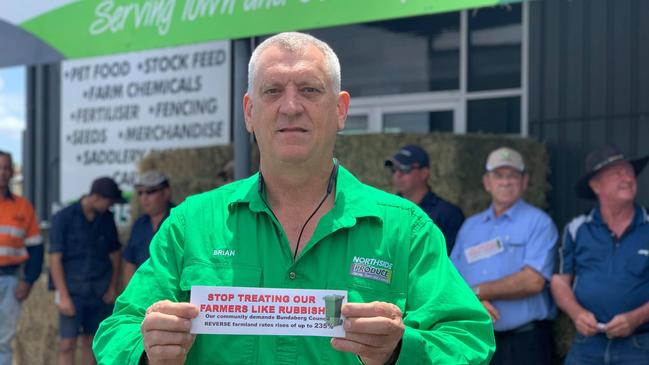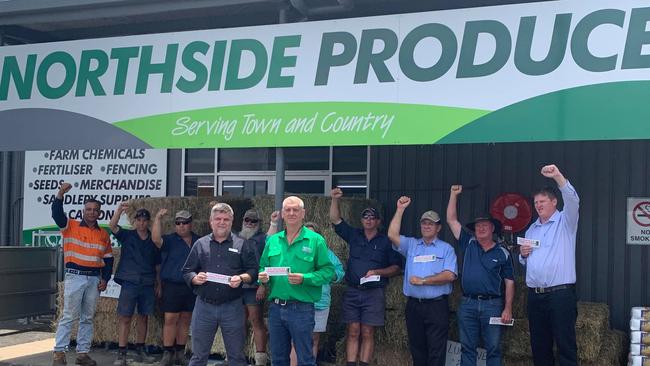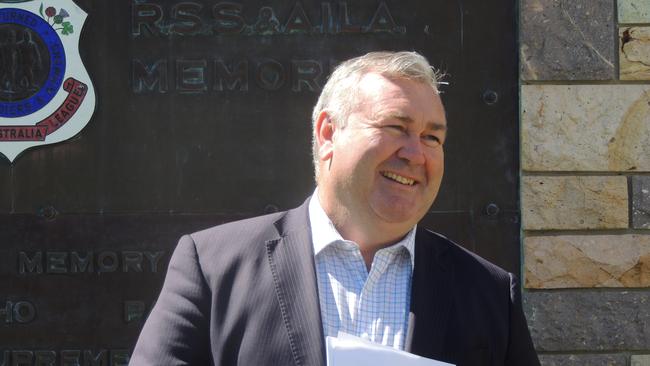Business joins fray as council, farmers double down on rates
THE LATEST: Breakdown of land valuation objections revealed, businesses join the bandwagon and both sides remain steadfast

Bundaberg
Don't miss out on the headlines from Bundaberg. Followed categories will be added to My News.
The Bundaberg Regional Council and a consortium of farmers lobbying against rate rises are no closer to a resolution as they continue to "trade blows" this week.
There are 12 categories in the Bundaberg Regional Council's budget and farmers are campaigning against the rise in the agricultural land category.
General rates are calculated by multiplying the rateable value of a property by the category's cents in the dollar rate.
A Department of Natural Resources, Mines and Energy spokesperson said a total of 68 objections were received from 1800 rural land valuations issued in 2020 for the Bundaberg Regional Council area.

The NewsMail understands, all 68 objections were assessed and 34 objections were upheld and reduced land valuations were reissued.
The majority of objections centred around the significant increases in values since 2017, comparisons with the valuations of other farming properties and diminished productivity of the land.
The spokesperson said rural land values in the Bundaberg Regional Council area increased by 46.6 per cent in 2020 due to a strong demand for both small and larger size rural properties.
"The ongoing demand for horticultural land suitable for small crops and tree crops has been a contributing factor to the increase in rural land values in Bundaberg Regional Council area," the spokesperson said.
"A total of 68 objections were received from 1800 rural land valuations issued in 2020 for the Bundaberg Regional Council area.
"The majority of objections centred around the significant increases in values since 2017, comparisons with the valuations of other farming properties and diminished productivity of the land.
"Objections form an integral part of the land valuation process and every landowner in Queensland has the right to object to an issued land valuation."
Meanwhile members of the business community have publicly thrown support towards the farmers' cause.
The farming consortium gathered at Northside Produce with Bundaberg and District Chamber of Commerce president Tim Sayre yesterday to discuss the potential flow on effect of the rate rise to their sector.
Northside Produce agency owners Brian Gordon said in a business that was directly linked to the farming industry, any increase in farmers' expenses meant a reduction in the spending at local businesses.
While Mr Gordon's business hasn't experienced that loss yet, he said there was a "lot of talk about the what ifs".
Supported by at least 400 farmers who were regular customers, he said the flow on effect was a concern for them.
Mr Sayre said it had been a difficult few years for local farmers with drought, fires, COVID-19 and now this rate rise.
"We need to get some support behind our farmers, businesses [are] prepared to do that, we need to get the community behind us as well," he said.
"To bring it in as hard and as much as the council have done with little consultation just doesn't seem fair... particularly at this time after we're starting to see some sort of recovery after COVID and we may even get a bit of rain this year which will be nice to see for our farmers."
Mr Sayre said the local economy was agri-based which meant it was supported by the farming community.
"It will have a massive flow-on effect through the rest of our economy and something needs to be done to correct this," he said.
"We know that the council is saying that essentially their rates and their budgets are locked in but we believe where there's a will, there's a way.
"We'd like to see council actually review and hopefully reverse its decision …"
AgForce's Tom Marland said they had support from more than 30 local businesses and that the group wanted to sit down and have a conversation with council about the issue.
While they were currently "trading blows in the media", he said farmers wanted the issue fixed and they would continue the campaign until "council sees reason".
A Bundaberg Regional Council spokesman said rates in the agricultural category increased by an average of 45 per cent because the State Government's Valuer General reported a 46 per cent valuation increase across the category.
"The overwhelming majority of ratepayers had no increase in rates because their valuations didn't change," the spokesman said.
"In order to have maintained the same net financial position ($5.2m deficit) and reduced agricultural rates below their valuation increase, council would have had to raise rates for residential mums and dads, pensioners, battlers and small businesses who saw no increase in their property wealth.
"If any ratepayer has difficulty in paying they should contact Council and apply for hardship relief, which will be assessed on the evidence presented."
The NewsMail understands that while there is a different process for ratepayers with a commercial aspect to their property when applying for an individual hardship concession, they can still apply.
Rather than having farmers file individual petitions for hardship concessions, Mr Marland said they believed a broad concession across the whole category should be applied.

Local farmer and Bundaberg Canegrowers director Dean Cayley described the campaign as successful thus far, though he was disappointed by the lack of feedback.
"We've personally written them letters to engage with us to try and sort this out, I've had one councillor who's written back to us who wants to meet with our consortium … which is good, but it's disappointing we haven't had any other councillors call back and talk to us," he said.
A council spokesperson previously told the NewsMail, the full council met with Isis Canegrowers and Bundaberg Canegrowers before adopting the Budget.
"The mayor said he expected the overall rate revenue increase to be in line with CPI, which it was".
"Also, he made the comment on 19 March before COVID-19 lockdowns began and before Council knew how much its revenue would be reduced," the spokesperson said.
"The Budget was adopted unanimously."
Recently, mayor Jack Dempsey sought to clarify the increased revenue from agricultural rates, which was not $5 million with an average 100 per cent increase.

"The fact is that agricultural general rates revenue went from about $7.6 million across the whole of category nine in 2019-20 to a projected $10 million," he said.
"That's a variance of $2.4 million whereas the rural lobby groups believed it was $5 million.
"I can understand their outrage believing there was a 100 per cent increase in the revenue collected and a 100 per cent average increase for all agricultural ratepayers."
Cr Dempsey said the confusion was believed to have stemmed from an email in May where a $4,960,000 figure was misinterpreted as the general rate income levied on Rating Category 9 for 2019/2020, rather than the gross value of rates collected from those farming sugarcane.
Regardless of the value, Mr Marland said that was money going out of farmers' pockets.
Mr Dempsey called on them to "put down their pitchforks and end the campaign".
"There are bigger fish to fry during the State Election, particularly with Paradise Dam being such a critical issue for our region's future and we should be working together on this," he said.
Responding to the mayor's request, Mr Cayley said "it won't be happening, Jack".
In a 'myth-busting' themed post, Mr Dempsey said Canegrowers and BFVG hadn't presented "any evidence to show all their members are struggling so much they can't pay rates, which are tax deductible".
"Some agricultural ratepayers are multinational corporations and it's hard to conceive how they might be battling so hard they can't afford to pay," he said.
"Individuals can already apply for support under Council's hardship policy, but they need to provide proof of their circumstances.
"Individual ratepayers who are suffering genuine financial distress can negotiate payment terms under the hardship policy."
He said only one property went up 235 per cent and the valuation for that property changed from $113,000 to $375,000.
Mr Marland previously told the NewsMail that while the council has stated rate rises have gone up in line with valuations which have increased by an average of 46 per cent, "168 farmers have had their rates more than double, 64 with a 90 per cent increase, 125 with a 80 per cent increase, 167 with a 70 per cent increase, 252 with a 60 per cent increase and 318 with a 50 per cent increase".
MORE STORIES
• 'Set in concrete': Why the council's sticking to rates
• DAM DEMAND: How you can voice your future water needs



